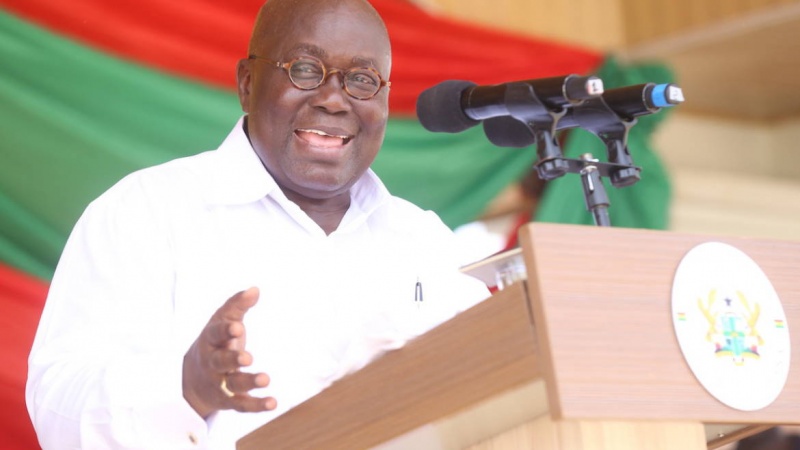
President Nana Addo Dankwa Akufo-Addo, on Tuesday, 20th February, 2018, launched the 10-year Cahsew Development Plan, in Wenchi, in the Brong Ahafo Region, a plan aimed at diversifying Ghanaian agriculture.
Recounting a commitment he made on 19th March, 2016, at Suma Ahenkro, in the Jaman North constituency, President Akufo-Addo bemoaned the over-reliance of Ghanaian agriculture on the production and export of cocoa, in contrast with the situation in neigbouring Cote d’Ivoire.
He noted that Cote d’Ivoire has succeeded in diversifying its agriculture, which included the production and export of other cash crops, and, as a result, earned that country some $12 billion from the export of agricultural produce in 2015.
“To that end, I reiterated my commitment to assist in diversifying Ghanaian agriculture, and transforming, amongst others, cashew into a major cash crop and foreign exchange earner for Ghana. This morning’s event, ladies and gentlemen, is the beginning of the realisation of this vision,” the President said.
Highlighting the success of the first year of the Programme for Planting for Food and Jobs, which led to an increase in the production of staples, as well as the creation of thousands of jobs in the rural economy, President Akufo-Addo noted that this development has encouraged government to increase the scope of the programme.
“The Programme is expanding its focus not only to the production of staples, but also to the development and production of some selected crops such as cashew, oil palm, rubber, shea, cotton and coffee, for good reason,” he said.
The President noted that two out of the top five cashew producing and exporting countries can be found in West Africa, i.e. Nigeria and Cote d’Ivoire, countries that have the same geography and topography as that of Ghana.
Therefore, as part of the Plan to boost the production of cashew, the Rural Development Department of the Ministry of Local Government and Rural Development, together with the Ministry of Food and Agriculture, are spearheading the initial production of seedlings for the cultivation of cashew in the country.
“Under the Planting for Export and Rural Development (PERD) project, all 216 Metropolitan, Municipal and District Chief Executives have been given oversight responsibility for the production of not only cashew seedlings, but also for seedlings of oil palm, shea, cotton, rubber and coffee, for distribution to farmers from next year,” the President said.
He continued, “The seedlings, once distributed, and planted by farmers, will ensure that more rural jobs will be created, in addition to an increase in yield. The potential for further job creation down the value chain through agro-processing is enormous.”
Again, towards the improvement of the country’s current yield, the Ghana Export Promotion Authority commissioned a cashew mass spraying exercise, in Wenchi, involving the provision of GH¢1.6 million for the spraying of some 30,000 hectares of cashew plantation. This is expected to increase cashew production for this crop year by some 30%.
These initiatives, the President added, form an integral part of the Cashew Development Plan, with the plan seeking to improve research methods, introduce appropriate production and processing technologies, as well as develop marketing strategies, amongst others, along the value chain.
He, therefore, urged the Ministry of Food and Agriculture and the Ghana Export Promotion Authority also to incorporate, in this Plan, policies and interventions that will create additional businesses and job opportunities in the areas of storage, transport, and packaging of cashew, which will ensure that our cashew farmers earn higher incomes.
President Akufo-Addo reiterated the commitment of his government to follow through fully on the implementation of this Plan, in addition to other programmes, to propel the growth of the cashew industry.
“I urge the Ministries, Departments and Agencies, our Members of Parliament, farmers, and the private sector to do everything possible to support the Cashew Development Programme. This, together with the other programmes for other selected export crops, would drive industrialization in rural Ghana, diversify agricultural exports, and provide the needed jobs for the teeming masses of unemployed youth of this country,” President Akufo-Addo added.

































